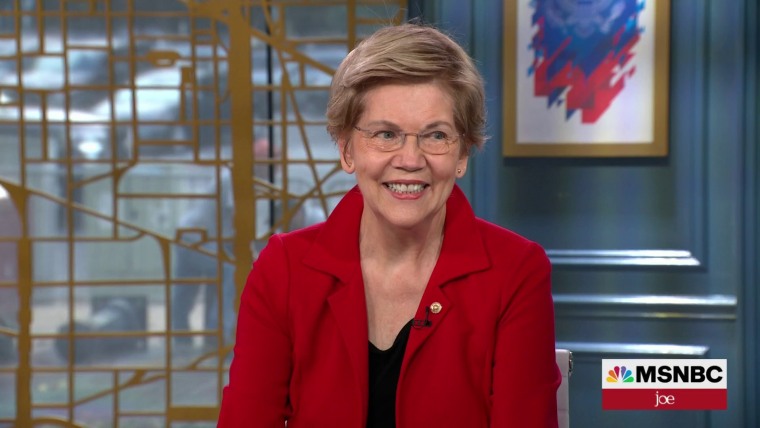WASHINGTON — Democrats' plan to tax billionaires excites the party's base. It could be attractive to Sen. Kyrsten Sinema, D-Ariz. And it might be unconstitutional.
Party leaders have been scrambling to find alternative ways to pay for part of the trillion-dollar-plus "Build Back Better" bill because Sinema has ruled out raising income tax rates on high-end earners and corporations.
A proposal released Wednesday morning would tax the paper investment gains of the ultra-wealthy. The idea is to capture revenue from billionaires whose "tradable" assets — like stocks — appreciate in value each year without being taxed. Under current law, those gains aren't "realized" and taxed until the underlying assets are sold.
The tax would also apply to the tradable assets of people who earn $100 million or more in three consecutive years, but it would not apply to property such as real estate.
An ally of Biden's, Rep. Brendan Boyle, D-Pa., a member of the tax-writing Ways and Means Committee, has worked on a version of the wealth tax with Sen. Elizabeth Warren, D-Mass. He said in an interview Tuesday that it is easy for the government to tax all of the earned income of workers, while the country's wealthiest investors can simply earn value by holding on to untaxed investments.
"That ends up being very unfair," he said, adding that he is confident that the plan would survive constitutional muster.
Tax law experts disagree about whether such a provision would be consistent with the Constitution, but Daniel Hemel, a University of Chicago Law School professor, said Democrats would be taking their chances with a conservative Supreme Court.
"This approach makes the Democrats' plan for taxing the wealthy contingent upon Brett Kavanaugh, and there are lots of constitutionally uncomplicated ways to tax the very rich," Hemel said. "But it seems like Democrats are coalescing around one of the approaches for which there are genuine constitutional doubts."
The question for tax writers and party leaders is whether they can thread both the political and the constitutional needles in drafting the details.
Clear majorities of Americans favor taxing the rich more. In a Morning Consult/Politico poll last month, 68 percent of registered voters said they support raising taxes on the wealthiest people. But few if any independent surveys delve into the question of taxing the unrealized gains of billionaires.
Still, not every Democrat in Congress is sold on the latest approach yet.
"It's new, so implementation becomes an issue," said Sen. Jon Tester, D-Mont., who added that he hasn't passed judgment one way or the other. "I've really got to study it."
Senate Finance Committee Chairman Ron Wyden, D-Ore., the author of the provision, said he is confident that it would survive legal challenges. As proof, he cited lower court rulings in which the taxation of unrealized gains from futures contracts "has always been upheld."
Legal scholars say that even if courts ruled in favor of taxing unrealized gains at their increased values — known as a "mark to market" assessment of value — it's unclear how they would approach the constitutionality of a tax conditioned on the wealth of the taxpayer rather than on his or her income.
"There are plausible arguments on both sides," said Andrew Hayashi, a professor who is the director of the University of Virginia's Center for Tax Law.
When the Constitution was ratified, it required that "direct taxes" be apportioned among the states "according to their respective numbers," meaning each state would have to cough up an amount proportional to its population. The 16th Amendment created an exemption that allows the federal government to collect income taxes.
The basic questions for the courts are whether a federal tax can be based in part on wealth and whether paper gains on assets can be taxed as income before they are sold.
From a political perspective, Democratic leaders may end up caring more about whether they can pass the provision than whether it would survive a court challenge. The billionaires tax can't be ruled unconstitutional unless it has first become law.
However, the possibility that a successful court challenge would add to the deficit could scare off lawmakers who want to ensure that the "Build Back Better" measure remains deficit-neutral. Biden has promoted his plan as having no cost, because its spending would be offset by new revenue, and Sen. Joe Manchin, D-W.Va., a key swing vote on the overall legislation, has emphasized balancing the revenue and spending.
Still, it is easier for Democratic leaders to count votes than it is for them to predict court rulings.
"I'd give it a 50 percent chance," said Hemel, who called the wealth tax a "good idea" in a Washington Post op-ed. "We've got lots of other options that are 100 percent chance."
"politic" - Google News
October 27, 2021 at 07:03PM
https://ift.tt/2XNg683
Billionaires tax faces constitutional, political hurdles - NBC News
"politic" - Google News
https://ift.tt/3c2OaPk
https://ift.tt/2Wls1p6

/cloudfront-us-east-1.images.arcpublishing.com/bostonglobe/VNG7YMZTRWJ5WBFTJ5NVETPCQI.jpg)
No comments:
Post a Comment